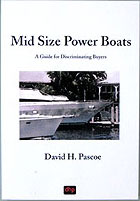The Importance of Proximity
Where you keep your boat – both in season and out – will have a major effect on your boating experience and its cost.
Let’s use two examples here, the first of which is an owner who lives on waterfront property and keeps his boat at a dock in his back yard.
The second is an owner who keeps his boat at a marina thirty miles from his home.
The point is obvious, is it not? The second fellow will either spend a huge amount of his boating time driving back and forth – or, more likely will end up not using his boat nearly as much as he anticipated, as well as skimping on maintenance due to a lack of time.
Whereas the first owner not only will likely find plenty of time to get things done (he’ll do tasks in the evening that the other guy wouldn’t be able to do), but he’ll also have far more time and opportunity to actually enjoy his boat.
Is it possible to be a distant owner and still enjoy the benefits of the first owner?
Yes, and the people who do are the sort that routinely spend weekends aboard their boats. Many boat owners live long distances from where they keep their boats, but solve that problem – at least partially so – by spending weekends on their boats.
They take off on Friday night and return Sunday evening. Sometimes they work this arrangement simply because they do not live near a suitable boating area, in other instances they keep their boats a long way from home because they wish to keep their boat in a more desirable location for boating.
Whatever your situation and plans are, be sure to consider the issue of proximity and whether or not you’ll really have the time at hand to do the things you want to do, as well as the things you should do. In the end a lot more money may be involved than expected.
Cost/Time Benefits
How much is your free time worth? What are you willing to pay for pleasure? I’d venture to say that not many people ever ask themselves this question before buying a boat.
To find the answer simply divide the price of the boat plus the cost of ownership by the number of years you own it times the annual hours of use and you’ll have the cost per hour of use.
A typical boat owner in a short season climate (3-4 month summer) will put about 100 hours on the engines.
Of course, the time the engines are running is not the only time he’s using the boat, so let’s double that and say the owner gets 200 hours of use annually.
This includes the time spent slurping cocktails on the aft deck. The cost of the boat, estimating very roughly, is $100,000 with another $12,000 for interest on loan, dockage, insurance, fuel and other expenses.
Therefore, on an annual basis, his cost per hour of enjoyment comes to about $560.00 per hour.
As you can see, this is an astonishingly high cost. There are 8760 hours in a year, yet the average boat owner gets only 200 hours of use. The remaining 8,560 hours the boat is just sitting unused.
We can put this into a better perspective by saying that there are only 10 usable hours per day, which reduces the usable time to 3650 hours, and therefore the boat spends only 3450 hours a year just sitting, but this is little consolation.
The average boater in climates with longer seasons or even all season climates typically gets double the usage from his boat. But averages mean little because some years we use boats more than others.
The only reasonable conclusion we can come to is that buying a large boat is not very cost effective investment in terms of getting the most recreational hours for your money.
The exception is for the owner for whom boating is his one and only avocation.
Then why do so many people buy boats, and who get so little use of them? The answer is that there is a very high turnover in boat ownership, in part because they discover this the hard way.
For the most part, the high cost of boating is justified by those for whom boating is or becomes an avocation.
Meaning that they’ll get far more than the average amount of time using the boat. For the owner who takes frequent boating trips and spends many nights on board, that cost of ownership can drop to nearly $100/hour, a rate which is considerably less than outrageous.
Getting Upside Down
Yet another reason people buy boats, don’t use them, but still hold onto them, is what we call getting up-side-down financially.
That means that the owner owes more on the boat than its market value. He doesn’t sell because he’d have to write a large check to his lender just to get rid of it.
So, he holds on and holds on, meanwhile the boat deteriorates and deteriorates and becomes worth progressively less and less.
In other words, the owner has set a trap for himself from which he can’t escape short of having to pay to get rid of his boat.
The way this trap is most often laid is by taking very long term loans with minimal down payments.
The marine lending market in recent years has become very competitive offering loans as long as 15-20 years.
A 20 year loan doesn’t make much sense when the average period of ownership is less than four years, so you can see how easy it is to get upside down. But it was not so long ago that the longest loan period was 5-7 years.
These very long term loans are not healthy for either the lender or the borrower, since the loan term often exceeds the life of the boat.
Even worse, a boat is not real estate; it will never appreciate in value. Thus, the long term loan with minimal down payment almost guarantees that the borrower will always be upside down, owing more on the boat than its worth.
Since the average period of ownership for all boats is less than four years, you can see that boat loans exceeding more than 7 years are pure folly.
The exception, of course, is that you have sufficient wealth that you are not at risk by getting up-side-down on a loan.
If this were the case, you’d be smart enough to avoid paying a financier all that interest for 15 years when you could just write a check and save yourself all that money.
HOME > Mid Size Power Boats >


